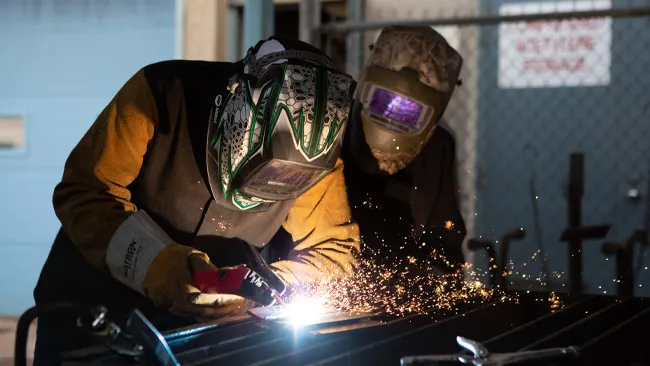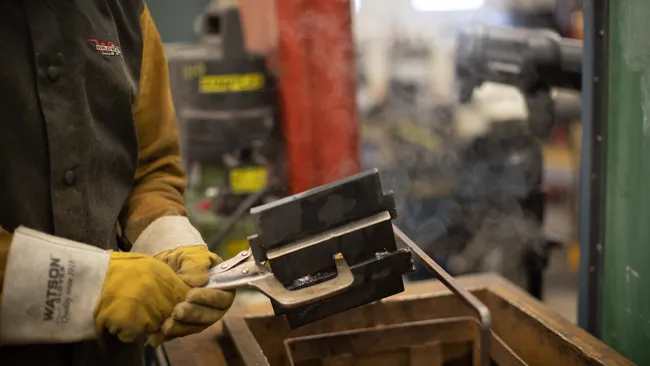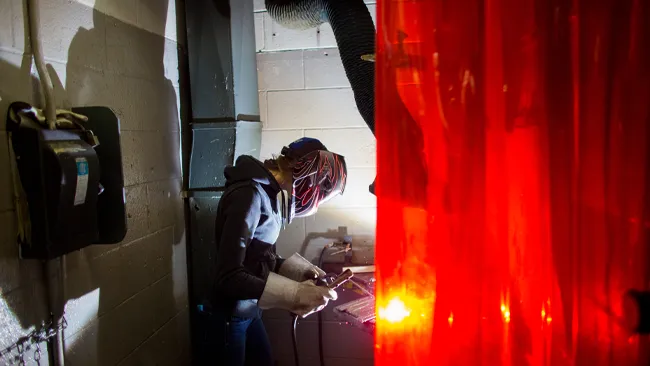Overview
Welding is the common core into all trades. Requiring precise hand skills and dedication, welding can be used for all measures of demand.
Demand for skilled workers in Canada continues to grow, and Lambton College is meeting this demand with programs aimed at creating new skilled workers who contribute to a vibrant local, regional, and national economy.
Welders in Canada are in high demand. As Ontario's construction projects and state-of-the-art manufacturing continue to expand, there will continue to be strong demand for welders in Ontario. The Welding Techniques program at Lambton College is an excellent way to take a step toward becoming a certified Welder in Ontario.
This full-time, one-year, post-secondary program covers core content found in the first level of the Welder (456A) and Metal Fabricator (437A) apprenticeship programs in Ontario. Students are given opportunities to challenge welding skills qualification tests as required by the Canadian Welding Bureau (CWB). Extra fees payable to this external weld testing authority will apply.
Graduates of this program who pursue apprenticeships bring valuable practical skills and experience to Ontario employers and make great apprentices in the field.
Admission Requirements
O.S.S.D. or equivalent with:
- Grade 12 English C or U
Mature Student Assessment for this program is available in the subject of English for the purpose of demonstrating proficiency in this required admission subject. For all other admission requirements, applicants must complete the required course(s) as listed above. For more information, please contact counselling@lambtoncollege.ca. Review the Mature Student Admission process.
Academic admission requirements can be obtained through Academic Upgrading and the Pre-Programs at Lambton College.
Women in Technology & Trades
Female students, alumni, staff, and faculty of the technology and trades programs at Lambton College meet once a month to:
- Network and support each other
- Share experiences
- Build a sense of community
Each year, the group attends a final retreat at Camp Ak-O-Mak. Learn more by emailing Nikki Noble or Erin Soeder.
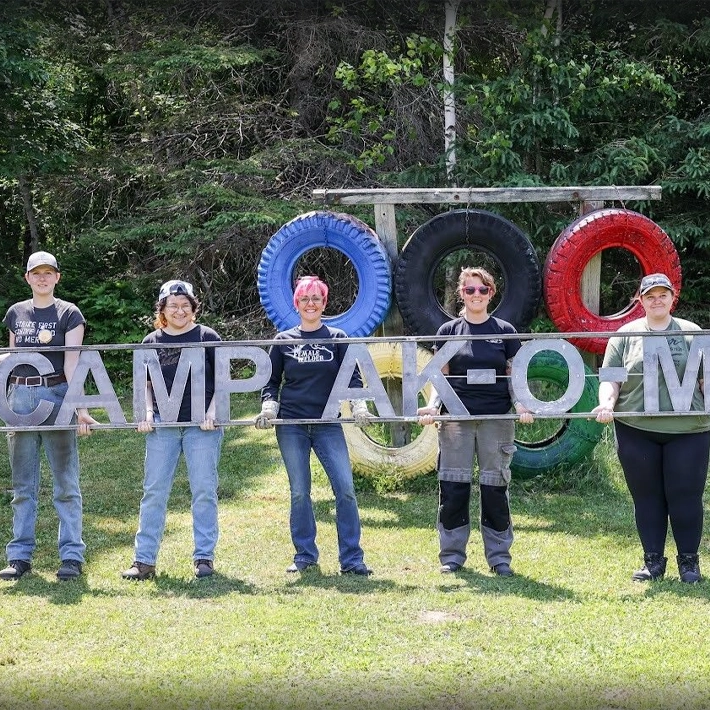
Costs
- Year 1 $4,100.94
Please Note: These fees apply to the 2023-2024 academic year and are subject to change. Fees do not include books (unless specifically noted), supplies or living costs.
Additional Fees
-
Welding Kit$400.00
-
Steel Toed CSA Boots$100.00
-
Boot Cut Jeans$30.00
-
Book for Winter Term$175.00
-
Welding Tests (CWB, TSSA)$1,004.00
*Welding Kit Includes
The campus shop sells a kit that includes the following items:
- Duffel Bag
- Notebook and pen
- Fire Resistant Welding Jacket with Leather Sleeves
- Flip up Helmet with Auto Darkening Lenses
- Welding Gloves (2 pair - light and heavy)
- CSA Safety Glasses
- Welding Cap
- Reflective Heat Pad
- Extra Clear Lenses
- Voucher for Discounted Safety Boots - purchased offsite
Technology Requirements
In order to keep pace with the requirements of each and every course in your program, Lambton College requires that each student have access to a laptop while studying at our college.
Labs & Equipment
Courses
Manual Welding Processes I
This course is designed to deliver the technical knowledge and techniques for the beginner in Shielded Metal Arc Welding (SMAW) process and basic Oxy-fuel Welding and Cutting (OFW/OFC) process. Shop safety will be an essential role and will focus skills towards continuing onto WEL-2027, Practical Weld Processes II. Upon successful completion of the course, the student will be able to perform fillet and groove welding with SMAW and OFW in accordance with government safety regulations, manufacturer's recommendations and approved industry standards with a focus of meeting or exceeding the testing requirements of CSA W47-1-2FG position regarding weld quality.
Fitting & Layout
Semi-Automatic Welding Processes I
In this course, students develop basic welding skills with the semi-automatic welding process including Gas Metal Arc Welding (GMAW), Flux Cored Arc Welding (FCAW), and Metal Cored Arc Welding (MCAW). Students will produce fillet welds in the 1-3 (flat, horizontal and vertical) positions. Upon successful completion, the student is able to describe the fundamentals, construction features, selection process and consumables of the semi-automatic process.
Metallurgy
This course is designed to provide the student with an introduction to welding metallurgy. The areas of study will include the structure and properties of plain carbon steel including testing for mechanical properties. The student will be taught basic metallography which includes specimen preparation and examination. In addition the student will study thermal equilibrium diagrams, isothermal transformation diagrams, the iron-carbon diagram and the effect of heat input upon a weldment. This course is designed to give the student an understanding of weld metallurgy. The knowledge obtained is considered as background for further metallurgy courses at Conestoga College for those students pursing the second year of the Welding Techniques Program. For other students, the course is designed to give a basic background of welding metallurgy in preparation as a welder.
Workplace Communications
This course focuses on skills required in any organization or position: writing business documents, responding to realistic scenarios, and speaking in an organized and vibrant manner. Students will practice professional and inclusive communications skills by producing, revising, and editing short business documents and engaging in verbal interactions and presentations.
Manual Welding Processes II
This course is a continuation of the WEL-1016, Welding Processes I. Students will learn the upgrade positions of Vertical and Overhead welding in fillet and groove joints. It is expected in this course that the students will apply their basic fundamental knowledge to enhance their welding skills. It is also expected that the students will be ready to qualify for their CWB tickets up to the "all position plate" depending on how they apply themselves. (Additional fees are required for testing.)
Advanced Welding Processes
Gas Tungsten Arc Welding Processes
This course develops the student with knowledge and manipulative skills in welding common joints in the flat, horizontal and vertical position using the Gas Tungsten Arc Welding (GTAW) process. Pipe welding using the GTAW process will also be introduced.
Blueprint Interpretation & Drawing
This course develops the student's ability to communicate though weld engineered drawings and sketching. Welders require the ability to sketch, read, and interpret blueprint drawings. These skills are necessary in order to comply with drawing standards and specifications while welding and fabricating. Topics in this course include sketching orthographic and isometric views, dimensioning, the title block and drawing notes. In addition, section views, detail and assembly drawings will be examined including bill of materials. Structural steels shapes, and piping will be explored with respect to project drawings. Students will explore joint design and welding symbols to help interpret blueprints. By the end of the course, students should be able to read a welding blueprint.
Job Search & Success
This course provides student with skills and knowledge to help support their career search and succeed in the workplace. Students align their personal skill set and goals to guide them on their career paths. They will learn how to effectively conduct a job search, build a professional and well-tailored resume and cover letter, and develop and practice interview techniques. Students will also develop their personal brand to help support effective career networking and aid in their job search. Teamwork and collaboration in the workplace are also discussed. Self-reflection is used to inspire insight and support their professional career journey.
General Education Elective
Contact
Program Information
1-844-LAMBTON
Applied Science, Engineering Technology & Trades
519-479-2337
Nikki Noble
PROGRAM COORDINATOR
519-479-2419
After Graduation
Employment Opportunities
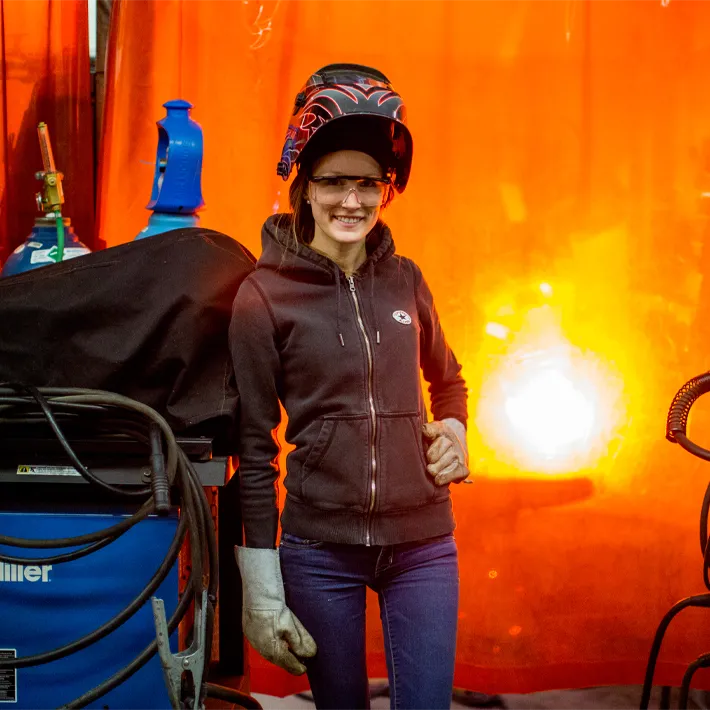
Successful students have the opportunity to branch out into many different career paths in the welding industry after completion of the program including union and non-union placements like: Welder, Welder-Fitter, Boilermaker, Pressure System Welder, Iron worker, Industrial Mechanic/Millwright, Pipe fitter, Steamfitter, Sheet Metal Worker, Fabricator, Maintenance Welder, Steel Artist, Robotic Welder Operator, Welding Inspector, Self-Employed Welder, and more. Some of these positions fall under different responsibilities within construction, service, and maintenance.
Please Note: Availability of jobs will depend upon the local economy.
Accreditations & Certifications
Canadian Welding Bureau
Students have an opportunity to challenge the Level I Welder 456A apprenticeship test on location after completion of the program (Students may also challenge Level II and III pending previous experience and credentials.) Students will be given the opportunity to challenge the Canadian Welding Bureau (CWB), Technical Standards & Safety Authority (TSSA), and in-house multiple process and position welding certification upon results. Students complete the program competent and ready for the workforce.
More Information
Skill Demands
As we want to ensure success, we strongly recommend students start the program with an updated eye exam from an optometrist. Hand skills can only be as detailed as the student can see. To ensure all the discontinuities are seen, students will need to see this as well in order to improve throughout the program.
Technology Requirements
It is recommended that students purchase a laptop with a Windows operating system.
Internet Speed Requirements
For best performance for students learning remotely, an internet connection with a minimum of 40 Mbps download and 10 Mbps upload speed is recommended in order to effectively use video conferencing and remote lecture delivery software as well as, other online resources remotely. Due to the large area over which students may be dispersed, we are unable to recommend a specific provider, so you will need to inquire around your area to find one that best suits your needs.
Minimum Laptop Requirements
In order to access the internet and virtually-delivered software and courseware, student laptops should include the following at a minimum. By meeting the following specifications, students will be equipped to access software and courseware on their laptop through the internet:
- Intel i5 8th Gen Processor or equivalent
- 16 GB of RAM (with a minimum of 8 GB)
- 100 GB HDD or more
- HD Graphics
- Webcam with a microphone
- Wireless 802.11n/ac 5ghz capable
- Windows Operating System (Windows 11)
Software
To ensure students are getting the most our of their classroom experience, some software will be required.
Lambton College has made this software easily accessible online. Students can leverage our Microsoft Office 365 software packages and services. In addition, much of the software you require for your courses will be available on demand for use on any device - on or off campus.

